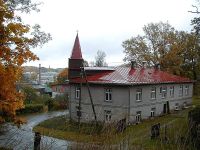Smiltene (pronunciation (help·info)) is a town in the Vidzeme region in northern Latvia, 132 km northeast of the capital Riga, and the administrative centre of Smiltene Municipality. It has a population of 5,536 (2015).
History
The area around Smiltene was a part of the Latgalian lands of Talava. After Crusaders had taken over most of the modern day Latvia, the area was part of the lands of the bishop of Riga. In 1359 on the steep hill near the river Abuls was built a castle. The tradesmen and craftsmen village around it - Smiltestele - first is mentioned in historical documents in 1427, since 1523 it was called a town. During the Livonian war the castle and the town were brought to ruin by the army of Ivan the Terrible. Under Polish–Lithuanian Commonwealth Smiltene and the area surrounding it were controlled by the starosta Kaspar Mlodecki.
In the early stages of the Great Northern War Smiltene was burnt down by the Russian army. After the war the area became devastated due to hunger and Bubonic plague. In 1708 the Swedish government built a new church and started the restoration of the village of Smiltene.
In 1760 the Russian empress Catherine II gave Smiltene manor as a present to the Governor-General Georg von Braun (Yuri Broun). During this time the manor was restored, from 1763 to 1771 were built manor buildings which have been still preserved. After the death of Braun his heirs sold the manor to the Riga merchant J.S.Baundau whose family had it for almost 100 years.
In 1893 the Smiltene manor was bought by Paul Lieven (of the Lieven family of Baltic German aristocrats), who split the land into parcels – thus creating the foundations of the modern day city. In 1901 electricity was connected in the Smiltene manor house. For Lieven's money a hospital, sawmill and electric station were built in Smiltene in 1903. After his suggestion and with his financial support a narrow gauge railway was built from Smiltene to Valmiera.
In 1920 Smiltene was granted the town rights
